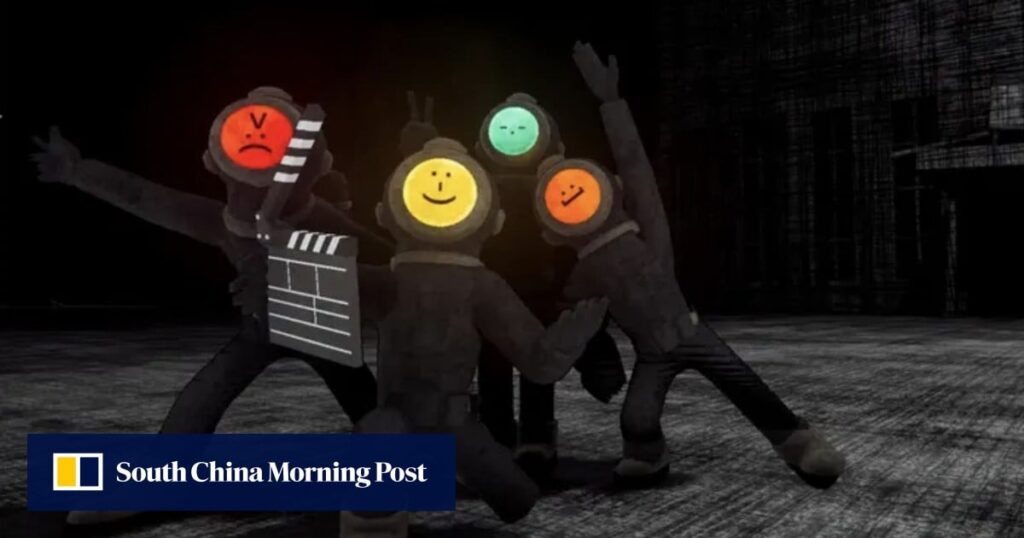Mine Craft, valheim and raftTo name a few examples, Sweden's small teams, or even one-man teams, have produced more video game hits than you would expect from a small country.
When Philip Westre, co-founder of small games developer Landfall, was asked to explain the success of the Swedish games industry, he said, “It's a cold climate. There's nothing in particular.''
The studio, located in a villa in a quiet suburb west of Stockholm, employs about 10 people and has been a surprising hit.

Following their tradition of releasing new releases on April 1st, they recently unveiled their latest game. Content warning.
The goal of this goofy multiplayer romp is to film your friends getting scared, upload the video to the imaginary social media platform SpookTube, and hope it goes viral.
In order to keep the game running smoothly, Ranfall decided to offer the game for free for one day, but without investing in any advertising.
To the company's surprise, more than 6 million people took up the offer in the first 24 hours.
Programmer Zoro Svardendal said one of the company's goals is to break the previous record for the number of people playing simultaneously on the gaming platform Steam.
This metric, known as Concurrent Player Count, is commonly used in the industry to assess a game's popularity. Landfall's previous record was 29,000.
“I think we hit 200,000 on the second day… which is pretty impressive,” Svardendahl said.
Content warning This is just the latest example of a small Swedish team finding great success.
In early 2021, Viking-themed valheim Created by a team of five people, it was released by studio Iron Gate and quickly gained a worldwide audience, selling over 12 million copies.
Another breakout hit, raft – where players are tasked with surviving on a raft floating in the ocean – was created by three college students.
Since its original release on May 17, 2009. Mine Craft ' became the best-selling video game of all time, and Mojang announced that it would have sold over 300 million copies in 2023.
“I think small teams can work and move very quickly,” Svardendal says.
Rather than having to negotiate approval through multiple layers of corporate bureaucracy, individuals can make decisions based on what they feel is right, he explains.
Svardendal believes that the smaller team's more agile approach was key to its success. Content warningdeveloped in just six weeks.
Some Swedish game developers have grown into major studios with hundreds of employees. for example, battlefield series – and Massive Entertainment is currently developing the next series star wars outlaws.
Sweden has a population of only 10.5 million people, but according to the Swedish Game Industry, Swedish games have been downloaded 7 billion times and it is estimated that one in four people in the world plays a Swedish game. Masu.
In 2022, the revenue of game developers in the country totaled SEK 32.5 billion (US$3 billion).
Per Strömbach, president of the Swedish Game Industry, said there are several factors that explain the country's gaming success.
We have many high-quality schools that train a talented workforce and a culture that promotes teamwork.
Additionally, since Sweden is a small country, the developers were looking for users from around the world from an early stage.
“We also have decades of tradition in the industry,” Strombach says.
The first seeds of the Swedish scene, he says, can be found in the “geek culture” of the 1980s.

The pioneers learned programming on Commodore 64 computers while learning game mechanics from role-playing games.
“No one imagined it would become a billion-dollar industry after that,” Strombach says.
At Landfall, Westre pointed out that Swedes are big gamers themselves.
“The gaming culture is very strong here, both in gaming and development,” he says.
Svardendahl added that the culture began to feed itself with young developers taking inspiration from their predecessors.
“As something really big, Mine Craft He himself was excited to learn that the game was developed in his country.
“It's a bit of a self-fulfilling prophecy. I knew people were making games in Sweden, so I knew I could make games in Sweden too.”


